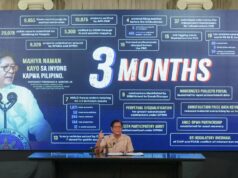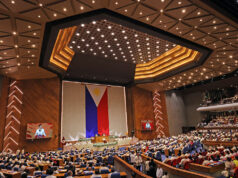SC questions selective tradition, discrimination in same-sex marriage oral arguments
By Dane Angelo M. Enerio
The Supreme Court (SC) on Tuesday afternoon questioned, among many others, the discrimination and the use of selective tradition against same-sex marriage in the continuation of the oral arguments on the petition seeking to legalize the union in the country.
“Why do we interpret our laws and our Constitution in such a way that we impose something on the freedoms and happiness of others without showing a very viable reason except tradition,” Associate Justice Mario Victor “Marvic” F. Leonen asked Solicitor-General Jose C. Calida during the oral arguments.
According to Mr. Calida, same-sex couples “can live together happily ever after but they cannot insist that they should be allowed to marry under our present law and out Constitution” as the “tradition that we should follow is the marriage between a man and a woman.”
Mr. Leonen, however, criticized Mr. Calida’s argument, saying, “we choose only portions of the past and claim it to be tradition.”
The magistrate pointed out: “(If) we look up the traditions of the past, Article 49 of (the Civil Marriage Law of 1870) applicable in the Philippines actually said the wife cannot manage her possessions or those of her husband, appear in trial, enter into contracts, or acquire by testament or interstate without permission from her husband” and that “the wife cannot publish writings or scientific or literary works.”
“That is our past code. Is that a tradition we must follow?” Mr. Leonen asked the Solicitor-General.
Mr. Calida replied with, “the main portion of that tradition your honor is the marriage between a man and a woman period and that has not been changed.”
“I still don’t get it why you can choose portions and claim it to be the tradition and the other portions as not part of tradition,” Mr. Leonen said, pointing out that marriage was not even defined in the 1935 Constitution.
“The only thing mentioned in the 1935 Constitution is the right and duty of parents in rearing the youth or civic efficiency. There is nothing about marriage, there is nothing about family. It only says about parents and their children,” he pointed out.
Mr. Calida insisted, “there was no need to mention because everbody knows was defined as a union between a man and a woman.”
But according to Mr. Leonen, “even during that time in 1935 there were lesbians, there were gays, there were bisexuals, there were transgenders and transexuals… I suppose even before that there were couples who wanted to marry.”
“It may not be written black and white but all the provisions there if we inter-relate it and together with traditions there’s no other interpretation rather than marriage as defined then and as defined now is between a man and a woman,” said Mr. Calida.
Associate Justice Samuel R. Martires, for his part, asked Mr. Calida, “why do we have to discriminate against same-sex marriage?”
“Since when has the state been in the business of marriage of opposite sex? Are not gay couple, lesbians capable of loving like the heterosexuals?” he added.
According to Mr. Calida, same-sex couples “are capable of loving but they are not capable of procreating.”
Mr. Martires explained to Mr. Calida, “[w]e’re now in 2018… Why is the state still sleeping and not facing this reality that nowadays, there are individuals who would like to be happy like the gay people, lesbians, the transwoman, transmen.”
“Why is the state so indifferent to the happiness of these people?” he asked.
Mr. Calida pointed out: “It’s the tradition and history of our Constitution.”
He said, “if there is a change, then I think we should lobby the framers (of the 1987 Constitution) now to include same-sex marriage but until that is done, we are stuck in the definition that marriage is a union between a man or woman.”
After the oral arguments, the parties were instructed to submit their memoranda to the SC within 30 days.
The petition by lawyer and gay rights advocate Jesus M. Falcis III – the first of its kind to be debated by the high court – seeks to declare unconstitutional Articles 1 and 2 of Executive Order (EO) No. 209 (Family Code) as they deprived same-sex couples the right to marry without substantive due process, denied them equal protection of laws, and violate their religious freedom.
It was filed against the Civil Registrar-General in May 19, 2015 with the support of two intervening same-sex couples who were denied marriage licenses despite being married under their religion.



